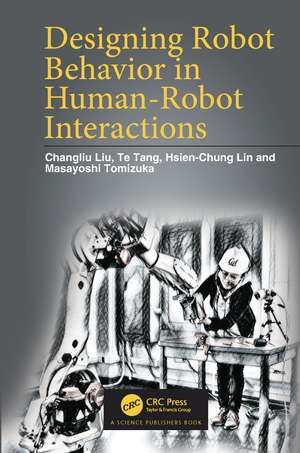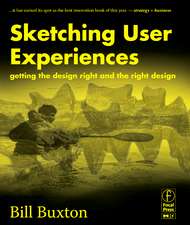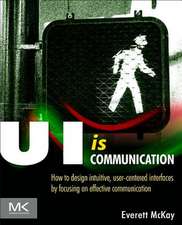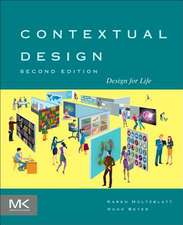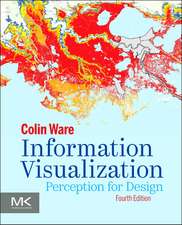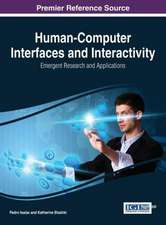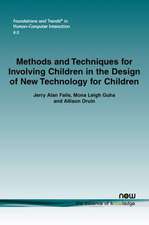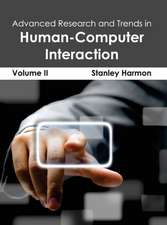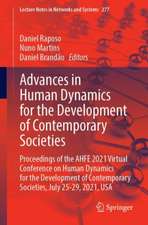Designing Robot Behavior in Human-Robot Interactions
Autor Changliu Liu, Te Tang, Hsien-Chung Lin, Masayoshi Tomizukaen Limba Engleză Paperback – apr 2021
Key Features:
- Proposes a unified framework to model and analyze human-robot interactions under different modes of interactions.
- Systematically discusses the control, decision and learning algorithms to enable robots to interact safely with humans in a variety of applications.
- Presents numerous experimental studies with both industrial collaborative robot arms and autonomous vehicles.
| Toate formatele și edițiile | Preț | Express |
|---|---|---|
| Paperback (1) | 287.31 lei 43-57 zile | |
| CRC Press – apr 2021 | 287.31 lei 43-57 zile | |
| Hardback (1) | 1222.16 lei 43-57 zile | |
| CRC Press – 25 sep 2019 | 1222.16 lei 43-57 zile |
Preț: 287.31 lei
Preț vechi: 414.03 lei
-31% Nou
Puncte Express: 431
Preț estimativ în valută:
54.98€ • 57.08$ • 45.85£
54.98€ • 57.08$ • 45.85£
Carte tipărită la comandă
Livrare economică 24 martie-07 aprilie
Preluare comenzi: 021 569.72.76
Specificații
ISBN-13: 9780367776572
ISBN-10: 036777657X
Pagini: 256
Dimensiuni: 156 x 234 mm
Greutate: 0.45 kg
Ediția:1
Editura: CRC Press
Colecția CRC Press
Locul publicării:Boca Raton, United States
ISBN-10: 036777657X
Pagini: 256
Dimensiuni: 156 x 234 mm
Greutate: 0.45 kg
Ediția:1
Editura: CRC Press
Colecția CRC Press
Locul publicării:Boca Raton, United States
Cuprins
SECTION I INTRODUCTION. Introduction. Framework. SECTION II THEORY. Safety during Human-Robot Interactions. Efficiency in Real-Time Motion Planning. Imitation: Mimicking Human Behavior. Dexterity: Analogy Learning to Expand Robot Skill Sets. Cooperation: Conflict Resolution during Interactions. SECTION III APPLICATIONS. Human-Robot Co-existence: Space-Sharing Interactions. Robot Learning from Human: Hierarchical Interactions. Human-Robot Collaboration: Time-Sharing Interactions. SECTION IV CONCLUSION. Vision for Future Robotics and Human-Robot Interactions. References. Index
Notă biografică
Changliu Liu is an assistant professor in the Robotics Institute at Carnegie Mellon University, where she leads the Intelligent Control Lab. She received her PhD degree from University of California at Berkeley in 2017. Her research interests include: robotics and human-robot interactions, control and motion planning, optimization and optimal control, multi-agent system and game theory, design and verification of safe intelligent systems.
Te Tang received his PhD degree from University of California at Berkeley in 2018. He joined FANUC America Corporation in 2018, and he is currently a researcher at FANUC Advanced Research Laboratory. His research interests include robotics, learning from demonstration, computer vision and their industrial applications.
Hsien-Chung Lin is a research engineer in FANUC Advanced Research Laboratory at FANUC America Corporation. Prior to joining FANUC, he received his Ph.D. degree from University of California at Berkeley in 2018. His research interests cover robotics, optimal control, human-robot interaction, learning from demonstration and motion planning.
Masayoshi Tomizuka received his PhD degree from MIT in 1974. In 1974, he joined the Mechanical Engineering Department of the University of California, Berkeley, where he currently is Cheryl and John Neerhout, Jr., Distinguished Professor. His research interests are control theory and its applications to mechatronic systems such as robots. He is a Life Fellow of ASME and IEEE, and a Fellow of IFAC. He was awarded the Rufus Oldenburger Medal (2002) and the Richard Bellman Control Heritage Award (2018).
Te Tang received his PhD degree from University of California at Berkeley in 2018. He joined FANUC America Corporation in 2018, and he is currently a researcher at FANUC Advanced Research Laboratory. His research interests include robotics, learning from demonstration, computer vision and their industrial applications.
Hsien-Chung Lin is a research engineer in FANUC Advanced Research Laboratory at FANUC America Corporation. Prior to joining FANUC, he received his Ph.D. degree from University of California at Berkeley in 2018. His research interests cover robotics, optimal control, human-robot interaction, learning from demonstration and motion planning.
Masayoshi Tomizuka received his PhD degree from MIT in 1974. In 1974, he joined the Mechanical Engineering Department of the University of California, Berkeley, where he currently is Cheryl and John Neerhout, Jr., Distinguished Professor. His research interests are control theory and its applications to mechatronic systems such as robots. He is a Life Fellow of ASME and IEEE, and a Fellow of IFAC. He was awarded the Rufus Oldenburger Medal (2002) and the Richard Bellman Control Heritage Award (2018).
Descriere
In this book, the authors provide a unified analytical framework for various human-robot systems, which involves peer to peer interactions or hierarchical interactions. The following topics are discussed: real-time motion planning, robot skill learning, mechanism design for conflict resolution, closed-loop analysis and safety verification.
